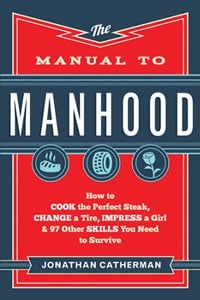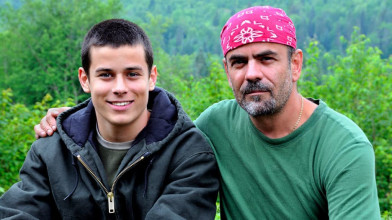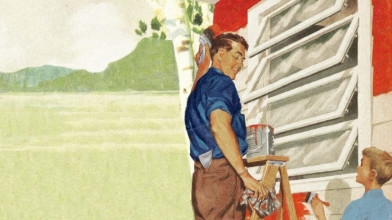Woman #1: What I think boys need most is just a really good dad.
Man #1: I have two boys that love to get up on top of the roof and I just tell ‘em, “Okay, if you’re cleaning out the gutters, just stay away from the edge.”
Woman #2: I’m trying to teach my son how to balance a spirit of tenderness, especially toward God with the strength of manhood.
Man #2: What it means to respect a woman, especially their mom, is something that I want them to know and to do very well.
Woman #3: If I can teach my boys nothing other than brush your teeth and put on deodorant, I think I’ve succeeded.
John: (laughs).
Jim: (laughs) That’s a good one.
John Fuller: Some great ideas there about training your sons to become men. And if you’ve got a boy in your home, or maybe you work with young boys at church or in school, you’ll probably have an opinion about what else should be added to that kind of list. This is Focus on the Family with Focus President and author Jim Daly. I’m John Fuller, and, Jim, I’d work pretty hard on a few of those issues with my boys when they were growing up. How about you?
Jim Daly: Me, too, John. Me, too. I remember how Jean and I were always reminding our boys to brush your teeth and use deodorant. Man, that’s carbon copy. Uh, sometimes I still remind them to do it, and I don’t want to embarrass anyone, but here we go. Uh, we’ve also had lots of family discussions over the years about the future of what being a good and godly man looks like. Uh, we’ve done Bible studies in that regard, because we wanted our sons to launch well. And every parent should have that same priority for both girls and boys. Uh, how to launch your children well. In our culture, we don’t have a, uh, good process for that transition from boyhood to manhood. I admire cultures like the Jewish culture, where you have a bar mitzvah, saying, “You’re no longer a boy, you’re now a man.” Uh, there’s a demarcation line. “You’re a boy yesterday, but today, you’ve made it to the big leagues.”
John: (laughs).
Jim: “Uh, you’re into manhood. Now, go get a job.”
John: There’s some good, practical encouragement (laughs).
Jim: It is. But we struggle with where that line is today. I mean, is it when you get your driver’s license, or when you’re able to vote? We can all fumble a bit at that moment, uh, where that manhood takes place. And, today, we’re going to cover that territory in the program.
John: Yeah. We’ll return to one of our “best of” broadcasts from a while ago. We recorded it with Jonathan Catherman. Uh, he’s worked for decades in private and public education, and has real expertise in youth and leadership training. Jonathan is the father of two sons himself, and he’s written a book that benefits pretty much any family raising boys. It’s called The Manual to Manhood: How to Cook the Perfect Steak, Change a Tire, Impress a Girl, and 97 Other Skills You Need to Survive. We’ve got details about that book at focusonthefamily.com/broadcast. Let’s go ahead and hear now, Jim, how you began the conversation with Jonathan on today’s episode of Focus on the Family.
Jim: Now, our boys are about the same age. I was curious about that.
Jonathan Catherman: Yeah, I almost regret not bringing them with me on this trip.
Jim: (laughs) That could’ve been fun. They could’ve gone fishing. (laughs).
Jonathan: Yeah, well, my boys have been fishing this weekend, so they would’ve liked to have done that again.
Jim: It’s a great experience. Uh, let’s talk about that in general. Paint a picture of the typical boy you meet. You’re engaging with a lot of young, uh, men. Uh, talk about, if we could, who is that typical boy today?
Jonathan: Sure. I- I- you know, I don’t mean to be too generic, but I think when we do a typical boy today, we almost have to do a comparison of when we were boys versus what boys are like today.
Jim: Is there a difference?
Jonathan: Oh, absolutely. The cultural norm has shifted so dramatically between when we were growing up and they are now. Like a boy today, your example being, um, deodorant.
Jim: (laughs).
Jonathan: Like, in- in the lead-in here.
Jim: We’re back to deodorant (laughs).
Jonathan: Wearing deodorant, right?
John: That’s what it’s going to be all program long.
Jim: Jean is very happy.
Jonathan: Well, how many options of deodorant did we have when we were growing up?
Jim: (laughs) Probably one. It’s called chalk.
Jonathan: The one you got out of your dad’s-
John: Old Spice.
Jonathan: Yeah, Old Spice, right? Well, now you’ve got 13 flavors of Axe, or scents. And you go down the aisle, what am I supposed to wear, and how much of it am I supposed to wear, and when am I supposed to start wearing it? And you’ll meet these young men today, and, again, I’m not just beating up all young men, but I am finding an inconsistency in the capabilities of young men starting at about age 11, 12, 13 years old, where they’re really struggling, trying to figure out how do they control everything. From wearing deodorant, to their voice changing, to knowing how to shake hands, to confidence that is just not being brought up like it was a generation ago.
Jim: You’ve written this book, Manual to Manhood, which I love. And you said yourself, it’s a simple approach to, uh, helping your boy become a man. And I understand you wrote this book because of a handshake. So how did a handshake lead you to writing a book?
Jonathan: Right. I was at a leadership conference at UCLA, and, uh, after I spoke, there’s this long line of “Let’s go shake the speaker’s hand.” This guy walks up to me, and I’d already noticed a couple patterns. One being, what is wrong with these young men? How come- don’t they know how to iron their shirts and their slacks? This is a global leadership conference, and they’re looking- they’re walking towards me like they just stepped out of their own luggage.
John: (laughs).
Jim: (laughs).
Jonathan: And this young man walks up to me, and it just clicked, because he gives me this just dead fish handshake. I’m like, I have yet to receive a good handshake out of everybody who’s met me. It’s either been overpowering or underwhelming.
Jim: Mm-hmm. Huh.
Jonathan: I said, you know what? We gotta do something, because these young people are the leaders of not just today. I mean, we were calling them leaders of tomorrow, but they’re the leaders of today as well.
Jim: Yeah.
Jonathan: And, uh, never before in history have, we been given more to steward, and we all will agree, to those who be given much, much is expected. But yet they’re struggling with the little things, yet we’re expecting them to steward the big things.
Jim: Yeah.
Jonathan: So let’s bring it all the way back down to something as simple as a handshake to demonstrate “I know how to control myself. Now, will you trust me with some values?”
Jim: So much of this is father engagement, too. And I think, you know, we fall on the excuses of “We’re busy,” and “They’ll get it. I got it. I didn’t have anybody telling me.” Uh, I mean, I didn’t have a dad in my life, and, uh, in that regard, I remember frantically trying to figure out how to tie a tie. This is before smartphones, and I’m probably in junior high going off to the junior high dance-
Jonathan: Mm-hmm.
Jim: And I didn’t have anybody to ask. So I kind of threw a knot together (laughs) and I think I got teased a bit for it. But the point of that is, um, you know, some dads feel like boys will figure it out. That’s not a good perspective, is it?
Jonathan: I don’t think it’s a good perspective at all. In your case, you said you had to experiment to get it right. So we can observe, and we can experiment. We can be instructed. And a father engaged, showing his son how to tie a tie, he might not get it the first time. But then we re-engage. It’s relational and it’s skill based. And so he walks away with a tie tied, and this feeling like he did it. So it’s the 12, 13-year-old. Dad’s thinking “I really did most of the work there.” Next time out, the son comes and says, “Dad, what do you think about my tie?” “Well, let me help you fix it up a little bit, son.” And now the son’s done the majority of the work. Third time around, Dad goes, “Your tie looks really well.” Well, we now have three engagements of compliment just about tying a tie.
Jim: Mm-hmm.
Jonathan: It’s bonding relationally as well as building the skill. Or you can experiment, and try it out, and maybe get teased, and see if you got it right or not.
Jim: Yeah. You know, you talk about that handshake. Something Jean and I did for both Trent and Troy-
Jonathan: Mm-hmm.
Jim: Both against their will was to enroll them in Cotillion. Now, a lot of people, I didn’t understand what that was when we first enrolled them. I said, “It’s going to be mostly about dinner table manners.” And that was only a small fraction of it. It was mostly about dancing (laughs) in appropriate ways, like ballroom dancing.
Jonathan: (laughs) Mm-hmm.
Jim: The waltz and those kinds of things. And, uh, they were mortified. And I remember the first night when I took my oldest, Trent, he just looked across the room at the beautiful Broadmoor ballroom here in Colorado Springs. It’s a gorgeous resort hotel. And, uh, he looked across the room at me, and his eyes are saying, “When I get a hold of you, Dad, you are dead.”
Jonathan: (laughs).
John: (laughs).
Jim: (laughs). ‘Cause that was the first time he had to hold a girl’s hand.
Jonathan: Mm-hmm.
Jim: And introduce, uh, his, um, companion to the adult chaperone. Shake the chaperone’s hand.
Jonathan: Mm-hmm.
Jim: And that, I would say, Trent told me this morning, he said, “That’s where I learned how to shake a hand properly and look the adult in the eye.”
Jonathan: Mm-hmm.
Jim: It’s important to know that.
Jonathan: It’s critical to know those little skills. When I meet young men today at a school or a conference, and I get the bad handshake, I’ll stop them. I’ll say, “All right, hey, man. Really nice to have met you. Let’s do that handshake over again. Now, look me in the eye. Good. Now, hey, excellent job. Now, next time you shake someone’s hand, that’s the way to go. A really good handshake. Congratulations.” I always lead it up to a compliment. Or how many times would you have done it wrong, and the person walked away thinking, what was that?
Jim: Mm-hmm.
Jonathan: So having an opportunity to be instructive. A- and your son’s going to an experience like that, that’s a controlled environment. It’s a safer, controlled environment. Or we can go out in the world, which is not one of the controlled environments.
Jim: Mm-hmm.
Jonathan: And there aren’t too many folks out there wanting the best for your- our boys. They’re wanting to get the best from our boys.
Jim: Mm-hmm.
Jonathan: So if we set them up for success with a simple handshake, they might look, Mom and Dad, at you now cross eyed, thinking you’ve got two heads growing out of your shoulders, going, “Why in the world are you teaching me how to shake hands?” These are the little things. Those who can steward little can learn to steward much, and shaking hands is a great place to start.
Jim: Uh-huh. It’s a good point. Um, talk about those bad role models in the culture today. It seems that the culture is demanding attention from our kids. They’re pulling them into the … Dr. Dobson used to describe it as a hallway of doors, and each door had a different label on it. Drugs, or premarital sex, or whatever it might be. And he said, in his day, the doors would be shut and locked. You’d have to find a way to get through the door. And then in the 80s, 90s, the doors were there, but they were just a little bit ajar. Today, I’d describe that analogy as wide open.
Jonathan: Mm-hmm.
Jim: Television is grabbing our kids. Uh, movies. Pop culture in general. How do we, um, train them to manage that as a Christian young man in a good way?
Jonathan: I think, honestly, the first training needs to come to the parent. Marketing is much better at gaining and retaining the attention of our young people than most parents are. The reason is because marketing teams sit around tables strategizing about how to get the attention of a young person, hold onto it, and extract value from it.
Jim: Mm-hmm.
Jonathan: Maybe as parents, as a men’s group or women’s group, or within the church, or just in my- how about Mom, Dad at your own home, sit down with your kids not there and strategize about how to gain and retain their attention. And something that, instead of taking value from your son or daughter, gives value to them.
Jim: What would that discussion sound like? Play it out a bit for us. Uh, you and your wife sitting down at the table. The kids are in bed. What would that discussion sound like?
Jonathan: You need to start with a description of where we are. Maybe talk about where we’d like to be. So what’s the aspiration? Where do we wanna see our sons, say, 3 years, five years, 10 years out from now? ‘Cause right now, if they’re young, they’re- essentially they’re dependent. Our intent is to get them to become independent, with a greater level of maturity beyond that even interdependent. So where do we want them to be? And then we back up the conversation to where are we now. But be realistic with your position where you are, not aspirational with where you are. Be aspirational with where you want them to go.
Jim: Mm-hmm.
Jonathan: You know, as- example is you stick with the example of shaking hands. We’d love to be able to see our sons be able to go to … They need to get a job in the next couple years. And the- you know, my son’s 14. In four years from now, he’s going to be 18. And he needs to be able to know how to work by then. Okay, so I shouldn’t- you know, “Hey, son- Reed.” My 14-year-old son is Reed. “Reed, come in here. You gotta start thinking about getting a job.” We just jumped the gun there.
Jim: (laughs).
Jonathan: Y- you went from zero to 100 in one sentence. So if the intent is for my son to be able to get and keep a job so he can earn his own money to start paying his own way and understand what finances and independence and interdependence looks like in the world, then let’s bring it all the way back to what is he capable of now, and how can we build him up into a place where at least independence is realistic, not aspirational.
Jim: Now, that- that is really good. And I’m thinking, a- again, my own boys. We’re right now talking about being able to do lawn work and things like that.
Jonathan: Mm-hmm.
Jim: So I just tell them, you know, “You need to make a flyer up, and determine what your price is going to be. And then you send those out, and if it’s not working, then you gotta go door-to-door, and kind of, uh, negotiate a good price.” And so I’m looking forward to seeing that unfold over the next couple of years.
John: Mm-hmm.
Jonathan: Well, and as adults, we have that background knowledge. You just described sales and marketing, right? We know what that is because we’re mature adults. They don’t know what that is yet, so you gotta walk them into the process, and be okay with them not being great at it at first.
John: Yeah.
Jonathan: Practice- Mom, Dad, hear me. Practice does not make perfect.
Jim: (laughs).
Jonathan: Okay? There’s only one who’s perfect, and his name’s Christ, and I’m not him. He lives within me, but that doesn’t mean that what we do is perfect. Practice simply makes better. And nobody- you’re not a failure until you give up.
Jim: Mm-hmm.
Jonathan: So if my son goes out, and he just botches someone’s yard, you know, he mows his- their yard, and it’s just a terrible … You know, weeds are still growing up on the sides. He didn’t do a good job sweeping. And it’s not a failure in the yard. You gotta go back and finish the job or fix the job. And next time, you’ll become better, and you’ll become better, and you’ll become better. I think we all need to look back to experiences in our own life when we were tweens and teens and young adults, and say, how many times did we have to practice something before we got it right?
Jim: Yeah.
Jonathan: Hopefully, nobody saw us get it wrong.
Jim: Yeah.
Jonathan: Because we want to- and this is something that I stressed, uh, heavy in the book about young men is they want to gain respect and avoid embarrassment.
Jim: Yeah.
John: Mm-hmm.
Jim: I think, uh, you know, an example for us, uh, my youngest, uh, Troy, wanted to play Little League this year.
Jonathan: Mm-hmm.
Jim: Now, he’s 12. He’s never played Little League. Some of those kids have been playing for five years. So ahead of time, I think, okay, (laughs) he’s not going to do well. He doesn’t have the skills. So I said to Troy, “You know, Troy, this will be your learning year. You’re gonna be, uh, at bat, you may not rise to some of the capability of the other kids, but that’s okay. This is your year to learn how to hit. The coaches will help you. Um, a couple of grounders might get through your legs, but don’t be discouraged.” He goes, “Oh, yeah, Dad. That’s okay. I know. This will be the year I’ll learn.” But it helps begin to frame. Because there’s gonna be those times when you don’t rise to the level of your peers because you haven’t done it.
Jonathan: Mm-hmm.
Jim: And, uh, you could put any circumstance around that, whatever your young man is going to be trying to do. A- and I think it’s helped him. I’ve seen it. He’s still engaged in that endeavor. He’s improving. But at the end of the game, the sting doesn’t last as long. Is that a good approach?
Jonathan: I think it is. I think it’s a great approach, because, again, it’s in- we’ve got another game coming. Let’s try it again. Practice a little bit better.
Jim: Right.
Jonathan: The worst curse I think we could bring upon ourselves in this context is that when the opportunity is there, we’re unprepared.
Jim: Right.
Jonathan: And so what we’re trying to do is prepare these young men so when the opportunity rises, they can rise to meet the opportunity.
Jim: And we’re reacting out of emotion, and that’s not a healthy place typically.
Jonathan: Yeah. That cannot be a healthy place, yeah.
John: I really appreciate Jonathan Catherman’s book, The Manual to Manhood, uh, because, Jonathan, you’re framing things in a big picture kind of way, but the subtitle is all about the little things. How to Cook the Perfect Steak, Change a Tire, Impress a Girl, and 97 Other Skills You Need to Survive. So you really are talking about little things that lead to big things. Uh, go ahead and stop by our website to find out more about the Manual to Manhood. Maybe get this, uh, CD or download the program so you can refer to it again. That’s focusonthefamily.com/broadcast. And I mentioned before we came into the studio that respect, that element of respect and avoiding embarrassment, I mean, that resonates with me. 13, 14, oh. Horrifically embarrassing years for me.
Jim: Those are mountain moments (laughs).
John: They are. They are. And my 11 year old, uh, Zane, is really into football. And I- I had kind of signed off on any physical thing for him. He just did not seem to have coordination when he was younger. That boy throws a really nice spiral.
Jonathan: (laughs).
John: And it’s because he has practiced it, practiced
Jonathan: Yeah.
John: But what I see is he is totally motivated by, uh, playground respect.
Jonathan: Mm-hmm.
John: It’s something that he intuitively wants to get and to avoid that embarrassment. Is that just something wired in us, or do we have to guide our kids to understand that?
Jonathan: I can’t wait to ask God that question.
John: (laughs).
Jonathan: Is it wired in? Is it part of the DNA of male to gain respect and avoid embarrassment? Certainly, the recurring pattern. I mean, I don’t know many men who aren’t concerned about that. I think we could boil it down in many different ways, but- but I think that most young men, and old men alike, from the youngest to the oldest among us, to gain respect and avoid embarrassment is a strong value. And I- I do think it’s something that God put into us. The question though is how do we go about doing that?
John: Mm-hmm.
Jonathan: And for your son, Zane, to throw a spiral, and everybody looks at him and goes, “Wow, look at that ball go.” That- you know what? It builds him up.
John: Yeah.
Jonathan: So what of the young man who doesn’t have Dad there throwing with him? Or maybe it’s not his deal, right? Maybe he doesn’t like sports.
John: Yeah.
Jonathan: So what else can he do to gain respect? You ever seen somebody swing a hammer, um, but they choke up on the hammer, and they’re holding it right up by the hammer head? And you’re looking at that guy going, who taught him how to swing a hammer? And the answer is nobody taught him how to swing a hammer.
John: Mm-hmm.
Jonathan: And that’s an awkward feeling to realize that everybody’s looking at you going, “This guy doesn’t even know how to use a tool.”
John: Huh.
Jonathan: Or overcook a steak.
John: Mm-hmm.
Jonathan: You know, where- where you’ve invited your buddies over-
Jim: Wait.
Jonathan: You got the grill going.
Jim: I’m still doing that one (laughs).
Jonathan: (laughs).
John: That’s because nobody taught you.
Jim: (laughs) I can burn anything on a grill, man. I’m telling you.
Jonathan: Well, l- let me- real brief, let me tell you something that happened. I was in south Texas, driving on the freeway, and I’d just come from a university speaking.
Jim: Mm-hmm.
Jonathan: And I was living the post-dopamine high of- of that was a great experience, right? And all of a sudden, I was in this car accident I didn’t see coming. And I was doing 75, and that’s just one of those things if you- if you don’t know you’re in a car accident 75 miles an hour on the freeway, and all the airbags are deploying, and all the glass is breaking. And you’re thinking- at that time, I was thinking I’m gonna die in this car accident.
Jim: Mm-hmm.
Jonathan: And I didn’t even see it coming. And only a- one other thought going through my mind is that who’s going to raise my boys.
Jim: Yeah, isn’t that interesting, at that moment?
Jonathan: Yeah, I wasn’t worried about my wife. She is street smart, and sassy, and beautiful. There’s going to be a long lineup at my memorial service of guys asking her out on a date. But my boys, who’s- who would raise my boys to be good men?
Jim: What did that motivate you to do after the accident?
Jonathan: Well, I stood on the side of the road with nothing more than a bruise on my hip and a totaled rental car.
John: Oh.
Jonathan: And, uh, and I said I’m going to go home and I’m gonna- I’m a decent dad. I’m going to go home and be a purposeful parent.
Jim: Huh.
Jonathan: So we started doing something at our house, and we played off out last name. Catherman is the last name. So we started thinking Cather-Man Missions. A Cather-Man Mission could be running errands and pumping gas or going to the grocery store and getting the shopping done, just the guys. You know, they need to know how to budget for burger over steak as much as they need to know how to- to, uh, change a tire. And so all the Cather-Man Missions are little, incremental rites of passage.
Jim: Huh. Those are good, good little things to be doing.
Jonathan: Mm-hmm.
Jim: Uh, talk to that single mom. I mean, this is part of our culture today, where dads are not involved for whatever reason in their kids’ and in their sons’ lives. Uh, talk to that mom who is desperate for a man to be a mentor to her boy. What can she do to a certain point, and then what can she not do to help that boy become a man?
Jonathan: Mm-hmm. First thing, Mom, thank you very much because you’re doing double duty. You’re doing the role of mom and the role of dad. And, uh, s- it can be hard for your son to come to you and say, “Hey, I- you know, I’ve got this peach fuzz on my face. What am I supposed to do with it?” And, you know, teaching your son to shave can be an awkward thing, or- or other topics. I mean, that’s just one of the simple ones. One of things, oh Mom, you can do is just look for ways to support him. There’s little things, like getting them resources like that. Don’t push them towards something. Get involved in a- in a church group that has got some great men who are willing to mentor your sons as well.
Jim: Mm-hmm.
Jonathan: It’s a biblical instruction for men to mentor. Uh, and the context is as iron sharpens iron, so does one man sharpen another.
Jim: Huh.
Jonathan: And that’s a great place for in a youth group or in a men’s group. Um, we’re supposed to raise up, you know, if- when you raise a child up in the ways of the Lord, he will not depart from it when he grows old. Mom, that’s your responsibility, but young men need to see that from a positive male role model as well.
Jim: Yeah. Hey, Jonathan, when you look at the culture today, uh, you know, there’s a real, uh, lack of chivalry.
Jonathan: Mm-hmm.
Jim: Um, and some women, young women particularly, are put off by it because they’ve been told by feminists and others that, you know, men shouldn’t do anything for you. You’re capable. And they are offended by it. You know, if a- sometimes when I’ve opened a door for a woman going into a business or something, uh, most times, to be fair, you get a- a courtesy thank you. But sometimes, you’ll get a woman saying, “I don’t need you to do that for me.”
Jonathan: Yeah.
Jim: I’ve actually had women say that to me. And I’m like, oh my goodness.
Jonathan: Mm-hmm.
Jim: What should we be teaching our young boys about how to treat women in a culture that doesn’t seem to understand how to treat women?
Jonathan: What’s the difference between opening the door for a woman walking through and opening the door like you did for me walking here into the studio today? This is common courtesy, to love your neighbor as you love yourself. And of course you can’t be all things to all people, and you can’t guarantee that they’re going to accept and- or reject what it is you’re offering. My wife did the same thing. When we were dating in high school, I opened a door for her, and she looked at me. I think I’d opened many doors for her, but this time, she crossed her arms and gave me the head bob.
Jim: (laughs).
Jonathan: And the hips way out. And she goes, “I can open my own door, thank you very much.” I’m thinking, w- where did that come from? And it really was this context of she appreciated the chivalry. At the same time, she’s perfectly capable. And I taught- I said, “Well, wait a minute. Time out. I’m not doing this for you because I don’t think you can. See that man walking up- that little old man walking up here?” I opened the door for him, too. I said, “I’m not trying to date him.”
Jim: (laughs).
John: (laughs).
Jonathan: “I’m just trying to be polite to others.”
Jim: Mm-hmm.
Jonathan: And this is one of the ways that we can demonstrate that I value others, not just myself.
Jim: Mm-hmm.
Jonathan: I’ve seen a lot of people go through the door valuing themselves. They open the door for themselves, walk right through, and it swings closed on the person right behind them.
Jim: Huh.
Jonathan: Moms, dads, teacher your boys how to be- open doors, to be chivalrous, to do for others as they want to be done for them.
Jim: Yeah, and that’s the point. You’re teaching a higher spiritual value there.
Jonathan: Mm-hmm.
Jim: Um, you’re not trying to be a downer for people at all.
Jonathan: No.
Jim: And I think that’s a great- a great value to teach. Uh, Jonathan, one of the most important things we need to pass onto our boys, uh, is our faith. I mean, that’s, like, job one. And, uh, describe how you’ve done this with your sons.
Jonathan: A long time ago, a very wise woman gave me instruction on how to speak to my boys. My boys were very little at the time, and, uh, Reed was- had a thermonuclear meltdown in a candy store.
Jim: (laughs).
Jonathan: Total temper tantrum.
Jim: Yeah. Never happened to me.
Jonathan: Never happened to anybody else. Only me, I’m sure.
Jim: (laughs).
Jonathan: Everybody’s watching us, and- and this woman who owned the candy store, she corrected me because I said to my son, “You’re embarrassing. Get up. Look, everybody’s watching you. You’re embarrassing yourself.” Translated, you’re really embarrassing me.
Jim: Right.
Jonathan: Uh, “You’re in trouble. Get up. We’re going home. You’re going to be in time-out.”
Jim: (laughs).
Jonathan: And she said, “Stop right now.”
Jim: Wow.
Jonathan: And she turned me around, and she said, “Put him right back down where you got him.” So down he went again, back into a temper tantrum, and she flipped the script. She went back down. She got down to his level and said, “Reed, will you repeat after me?” And in a series of repeats, he went from laying on the floor throwing a temper tantrum to sitting up, to standing up, to marching around her candy store, pumping his fists in the air, saying, “I am strong, I am brave, and I am of great courage.”
Jim: Huh.
Jonathan: I looked at her, and I said, “How did you do that? What are you, the child whisperer?”
Jim: (laughs).
Jonathan: And she got her finger in my face, and said, “No. You have to speak it so, Jonathan. You gave him no other options. You told him he was embarrassing and in trouble, going home to be in time-out.”
Jim: Mm-hmm.
Jonathan: “What else did you say to him?”
Jim: Ah.
Jonathan: I said, “I didn’t say anything.” She goes, “Every day, you need to tell him to be strong, to be brave, and to be of great courage.” Well, that plays over in the context of passing on our faith before our sons as well. They need to hear me speak of my faith. They need to see me living it out authentically.
Jim: Mm-hmm.
Jonathan: They need to know that the man that Christ has created who is in right relationship with his mother, who loves his sons as a father first, and also wants to be friends with them, who is honoring God and honoring others, this is the ethos of who he is. This is part of who he is. It’s not a Sunday, weekend experience. I’ve got to speak it so and live it so, as my sons … If you were to ask them today, “Who are you,” they would look at you in the eye and say, “Hi, my name is Reed Catherman.” “My name is Cole Catherman.” They’d shake your hand real well, and then they’d say, “I’m strong, brave, and of great courage.” And they’re men, I call them men in the making, of great faith because they’ve personalized the instruction they saw because I was not hypocritical in living it out.
Jim: Wow, that is good parenting advice right there. Jonathan Catherman, author of the book The Manual to Manhood: How to Cook the Perfect Steak … I gotta read that section, by the way. (laughs).
Jonathan: (laughs).
Jim: Change a Tire … I probably need to freshen up that one. Impress a Girl, and 97 Other Skills You Need to Survive. It’s great content, and thanks for being with us.
John: Mm-hmm.
Jonathan: It’s been a privilege. Thanks for the invite.
John: Some terrific insights for raising godly sons who will become confident, capable men. And I’m sure that many of our listeners have been encouraged by this conversation.
Jim: What a wonderful message, John. Uh, a great reminder for moms and dads about those practical skills that will help our sons succeed in life. If you have an adolescent or teen boy growing up in your home, this book is a perfect resource for them. It’s a simple and easy to read manual, and, man, it covers everything. Like setting the table for a meal, how to check the oil in a car, and even how to freshen up that bad breath. Uh, maybe you know a boy or young man who would benefit from such skills. Yeah, I’d love to put this book into your hands. If you can send a financial gift of any amount to Focus on the Family today to help families, we will gladly send you a copy of the Manual to Manhood. Now, if I could be honest, what we really need are faithful friends who will commit to a monthly pledge for the ministry because we depend upon your partnership with us to strengthen marriages, equip parents like we’ve done today, and provide all of the resources we have for families on a whole variety of topics. If you can sign up for a monthly pledge to Focus, that will really help us. But maybe all you can do right now is a one-time gift, and that will help us, too, obviously. Everything helps. Let me say thank you in advance for that support.
John: Yeah, we really are grateful for your generosity, and we’ll be sure to bundle an audio download of our entire conversation with Jonathan about his book. Uh, donate when you call 800, the letter A, and the word FAMILY. Or at focusonthefamily.com/broadcast. And coming up next time, we’ll hear from Dannah Gresh offering insight about your daughter and her relationships.
Preview:
Dannah Gresh: And until your daughter starts to do friendship the way God designed her to do friendship, it’s not gonna work.
End of Preview
Jim: And what is that?
Dannah: That is she needs to be a friend.























